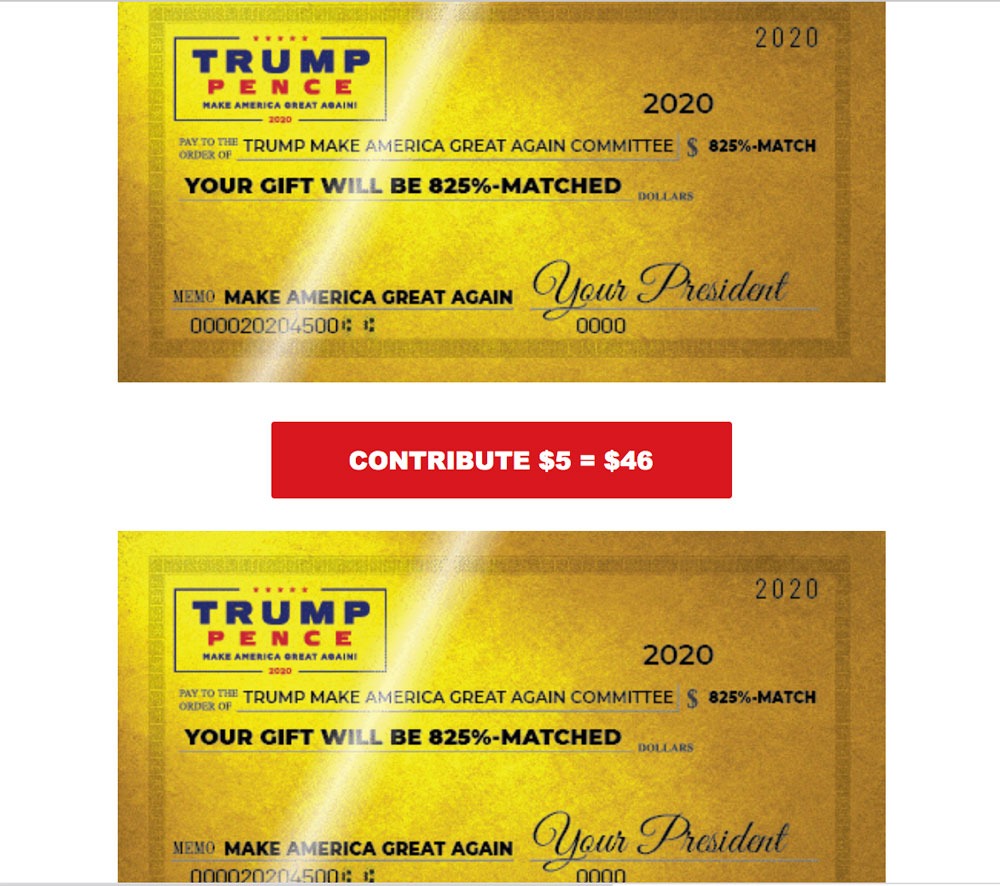
October 7, 2020; Mother Jones
Yesterday, we published a newswire noting that according to the Committee for Responsible Politics, the portion of the campaign money raised to date in this presidential election has gone up by more than 50 percent. This would be pretty good news for fundraisers more generally, except that the same day, Mother Jones revealed that some of those kinds of dollars were raised “in honor of VP Pence” by promising an 825 percent match. The email, writes Russ Choma of Mother Jones, implies President Trump himself is the donor providing the match and, as Choma writes, “In all likelihood, none of this is true.”
The email reads, “I know this is a big goal, but you’ve NEVER let me down before, and I know you never will. It’s going to take EVERY supporter stepping up if we’re going to succeed, and I need to know that I can count on you. This is so important that I’ve upped the stakes…For the FIRST TIME EVER: all gifts will receive an 825%-MATCH!”
This is not the first time Mother Jones has noted this new ploy for small donors, attributing the practice to both parties and casting doubt on whether the matches are real new dollars.
Sign up for our free newsletters
Subscribe to NPQ's newsletters to have our top stories delivered directly to your inbox.
By signing up, you agree to our privacy policy and terms of use, and to receive messages from NPQ and our partners.
Here’s the rub: Under campaign finance rules, no donor may give more than $2,800 to a single campaign this election. That means, to make sure a donation is matched, the campaign would have to find a donor who had given less than $2,800 so far this year—and if the campaign has a trove of untapped donors, it should probably start tapping them soon, given Democratic nominee Joe Biden’s fundraising advantage. If there are donors who have not hit their maximum contribution, they can only match today’s donations up to the limit. So, any gift over $339.39 will need to have more than one donor on hand to make an 825 percent match.
There’s one exception: The candidate himself can make as large of a donation as he wants. And that’s just what the email implies, with images of checks signed “Your president.”
So, where yesterday I may have given you to believe that we might be seeing a resurgence of small donors in the election that might carry over to charitable fundraising, a bit more research may be required—unless you want to guarantee matches that are likely beyond your capacity to provide at a scale likely to be worthwhile.
Dan Backer, a conservative campaign and election law attorney, suggests it is unlikely that anyone in the political arena would be charged with fraud over the matching schemes because, as Choma writes, “Candidates are given wide latitude over how truthful their political statements must be. But [Backer] says he’s not a fan of the tactic and advises his clients, which include both super-PACs and more tightly regulated committees, to devise a real matching program if they’re going to pitch one in fundraising appeals.” I guess that makes sense.—Ruth McCambridge













